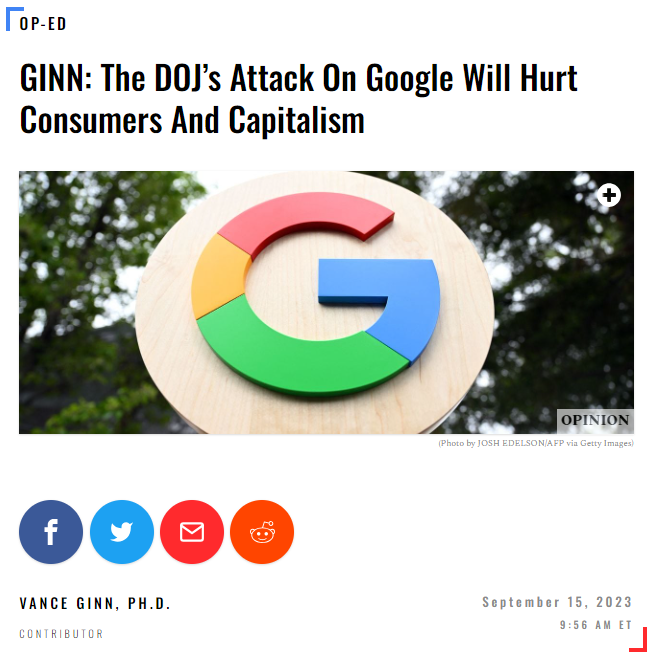|
The Biden Administration’s Justice Department took Google to a civil trial on Tuesday, beginning the department’s first major monopoly lawsuit since it took on Microsoft in 1998. What’s the allegation? Google supposedly violated U.S. antitrust laws. But it seems the main “violations” are that Google is good at what they do, consumers love their product and Microsoft is mad.
Jonathan Kantor at the Justice Department (and Lina Khan at the Federal Trade Commission) have pushed an endlessly fruitless crusade against “Big Tech.” Now, it has taken issue with Google’s methods of becoming the default browser on popular devices, which they’ve done through legal means that more savvy people might just call “marketing.” Products like iPhones and MacBooks make it easy for consumers to change their default browser to whatever they prefer. Most of them favor Google because they believe it’s a better search engine. Herein lies the real crux of the lawsuit. Antitrust laws were created to preserve competition. The original laws were rightly deemed too broad and vague, so a new guiding principle of the consumer welfare standard for enforcing these laws was implemented to consider whether consumers are better or worse off from the actions of businesses. In economics, consumer welfare is defined as the “value consumers get from a product less the price they paid.” That value varies from person to person, which is what makes free markets work. Consumers have the ability and the sovereignty to decide which product or service is best for them. To violate the consumer welfare standard would mean moving toward a monopoly. This is when a business has a large market share, or even the market share, such that they can raise prices of their goods or services regardless of quality. The outcome would reduce consumer welfare and, therefore, contribute to potential antitrust law violations. Found guilty, a business could be broken up into smaller parts, forced to sell off part of it or face penalties. In other words, it’s another hindrance to productive activities as targeted employers are forced to beef up on lawyers to deal with federal pushback instead of allocating those resources toward productive means that would help their employees and customers prosper. Despite what the DOJ claims, antitrust laws are rarely enforced to protect consumer welfare, and this case is no exception. Google is not only Americans’ preferred browser, but the company is consistently rated one of the best places to work. So, it seems most of its consumers find value in the product. If they don’t, they can use Bing, Firefox, DuckDuckGo or any other search engine that competes with Google and is readily accessible. So, if this case isn’t centered around consumer welfare or targeting monopolies, what is it really about? If the DOJ wins, which is highly unlikely, American competition and innovation will be stifled. This rent-seeking behavior may win votes with folks on the Left concerned with restricted competition and those on the right concerned about censoring on popular platforms like Google and Meta, but at what cost? Inhibiting free markets with increased regulations is far more likely to drive up prices and decrease consumer welfare than any part of “Big Tech.” This pursuit wastes taxpayers’ dollars that would be better spent elsewhere or, better yet, for the federal government to spend less so people have more money in their pockets to improve their own welfare. At a time when inflation remains too high, the labor market is cooling and Americans are suffering from a bleak economy, this lawsuit is a frustrating misuse of government resources. Moreover, government attempts like this to manipulate markets will always fail due to what economist Friedrich Hayek identified as the knowledge problem. He argued that information (knowledge) is decentralized, dispersed across society and not contained within departments of power. Central planners, in this case the DOJ (and FTC), do not have all the knowledge necessary to designate market competition, and they never will. Free market capitalism cannot be manipulated but must be allowed to work through spontaneous order. This lawsuit attacks free markets and, thereby, free people. Not monopolies or consumer welfare violations, and it’s abundantly clear that neither of those are real problems regarding Google. It’s time for the DOJ to accept defeat and focus on things that actually matter. Ganging up on Google amid all the problems Americans face today, while understanding legitimate concerns with some of Google’s actions, is out-of-touch, to say the least. Originally published at Daily Caller.
0 Comments
Leave a Reply. |
Vance Ginn, Ph.D.
|


 RSS Feed
RSS Feed